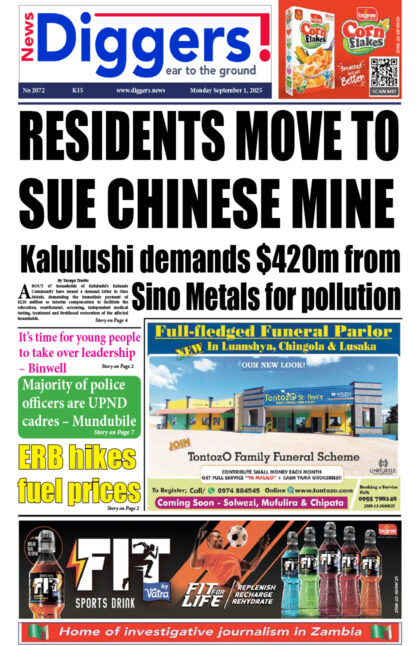PARTY for National Unity (PNU) president Highvie Hamududu says the 2019 mining fiscal regime is hindering government’s ability to maximize its financial benefits from the extractive sector, whilst equally hampering economic growth.
And Hamududu says the government is missing a great opportunity to use the mining sector to revamp the country’s economy as mining companies had slashed production in response to the measures that discouraged ramping up production.
In an interview, Hamududu said the continued implementation of the 2019 mining fiscal regime was hampering the country’s economic growth as evidenced by the significantly reduced economic activity recorded the last year.
“One of the key sectors that have the biggest impact on economic stability to bring up the fortunes that we are looking for is the mining sector. The tax regime, which is ruining the mining sector, is anti-growth and we have said many times that can we put in place a fiscal regime for the mining sector that promotes growth. I can tell you that if there is no growth in the mining sector, this economy can’t recover,” Hamududu, an economist, said.
“There are sectors when an economy is down, like the way it is now, there are some sectors with higher impact; what we call higher multiplier effect and that one is mining. One: it earns more foreign exchange; over 70 per cent of our foreign exchange comes from mining and our issue is the foreign currency crisis. Look at the exchange rate! The worsening of the exchange rate of the kwacha against foreign currencies…it means that, basically, the cost of living is going up; the cost of doing business is going up; the cost of servicing debt is going up; the cost of delivering services by government is going up because we are an import-dependent economy.”
He insisted that the mining tax regime was punitive because government was pushing to get more money from the sector, hence killing the economy.
“We have a huge debt that we are paying in dollars. So, one area that government must work on is to increase forex earnings and the sector that can quickly bring an increase in forex earnings is the mining sector. The fiscal regime we have put on mining is not correct. For example, the issue of mineral royalty, which is tax deductible, for income tax purposes is not correct. We have put a mining tax regime that does not obtain anywhere in the world; so we are making Zambia unattractive for investment and, therefore, the mining sector is hoarding away the investment,” Hamududu observed.
“The mining sector is the number one provider for Foreign Direct Investment; there is more investment that can come in the mining sector that can bring about stability; but the investors are sitting on the fence; they are just watching because we have not invited them. So, the fiscal regime is wrong because government is pushing to get more money through taxation and killing the economy.”
When asked whether it was necessary for government to maintain the existing mining fiscal regime, which raised mineral royalties by 1.5 percentage points across all levels of the sliding scale to ensure Zambians benefited more the mining sector, the former Bweengwa member of parliament argued that the assertion was not fact-based.
“Those are politics and it is just an argument that is not based on facts. You know, the tax regime must be comparable [with other countries in the region]. What is the tax regime of Botswana? What is the tax regime of Namibia? I am talking about the mining countries in the region; what is the tax regime for South Africa? What is the tax regime in DRC? So, taxes are not placed from without; there must be an international comparison. It is like a shop: if bread is more expensive in shop A and B, but in shop C it is cheaper, people will go and buy in shop C; it is simple economics,” said Hamududu.
“The main mining investors are opting to invest elsewhere and not in Zambia. So, Zambia is being starved of Foreign Direct Investment, is being starved of increased exports, which it can earn for itself and strengthen the kwacha. This is a scientific argument, not just from people on the streets, but the mining sector is the major employer on the Copperbelt. You will see now when the mining sector is not doing well, there is economic tension on the Copperbelt.”
The 2019 mining fiscal regime, which hiked mineral royalty rates by 1.5 percentage points across all levels of the sliding scale, among other measures, remains unchanged despite an outcry by miners since its formal implementation from January 1, 2019.
To-date, government has only suspended the 15 per cent export duty on precious stones with effect from January 1, 2020, according to Statutory Instrument No. 82 of 2019.
























